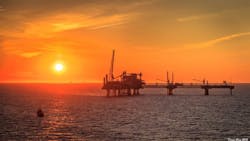UK government issues further guidance on offshore oil and gas project planning
Offshore Energies UK (OEUK) has commented on the UK government’s publication of updated supplementary guidance concerning the environmental impact of planned oil and gas projects in UK waters.
The association has told its member companies that they can now resume the environmental impact assessment (EIA) process for both existing applications and projects.
It follows a legal challenge last year brought against the ongoing Rosebank and Jackdaw projects in West of Shetland and in the central UK North Sea for environmental reasons. The projects are operated respectively by Equinor and Shell.
The guidance focuses on Scope 3 emissions and is intended to ensure that operators accurately report the full impact of the oil and gas produced in UK waters.
OEUK also reiterated its message of recent months that "homegrown" UK-produced resources should take preference over imported oil and gas, both of which, it claims, are often produced with greater emissions.
It also pointed out that the government’s independent advisers, the Climate Change Committee, have noted that even if the UK meets its current target of net-zero carbon emissions by 2050, domestic users and businesses will still need between 13 Bbbl and 15 Bbbl of oil and gas along the way.
But at present, UK Continental Shelf production will only deliver 4 billion of those barrels with OEUK member companies warning that even this is at risk in the present tax climate. However, with a more supportive government policy, the UK could meet half of the required oil and gas demand.
At the same time, the government is preparing to make decisions on the future of the oil and gas fiscal regime and licensing.
OEUK Chief Executive David Whitehouse said, “The UK’s offshore energy industry takes its environmental responsibilities seriously and has reduced emissions from oil and gas production by 28% since 2018. The North Sea is held up as one of the most robustly regulated sectors in the world, and our approach is recognized internationally as an example of good practice."
Related content:
To paraphrase from Dickens’ classic work, the North Sea has become a tale of two seas: the UK North Sea and the Norwegian North Sea. The difference is already being manifested in drilling activity and field development plans in the two regions. This difference is largely due to extremely contrasting fiscal regimes and regulatory policies.

